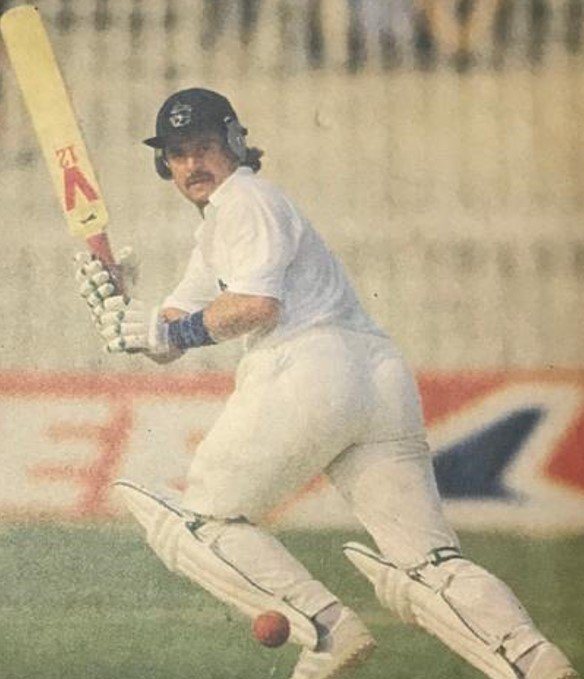Dasher Allan Lamb decks the West Indies in a match of the 1987 World Cup: After their opening World Cup 1987 match in Gujranwala, Mike Gatting’s (captain) men tried to give the nonchalant impression that beating the West Indies was nothing out of the ordinary for them now. But their immense pleasure and surprise could not be properly concealed.
It may have been England’s fifth victory over the West Indies in their last six encounters at one-day cricket, but the thrill is far from wearing thin. There are still many years of ignominy to avenge: four one-day victories between 1974 and 1986 were all that England had to its credit in a dozen years of playing West Indies, to set against innumerable defeats.
The official team version of events comes nowadays from the team manager, Micky Stewart, rather than the less eloquent captain. “We were always in with a chance, so long as Lamb was there,” said Stewart outside the England dressing room in Gujranwala, a facility so well-equipped, incidentally, that he called it “a five-star hotel.”. With respect, though, that’s the balcony.
Onslaught: England was dead, buried, and finished. As the comedian John Cleese might have said, it was an ex-England team when ten overs remained and 91 were still to be made. Sure, the West Indians had hit 82 from their last eight overs across a short and fast outfield, but they had six wickets in hand when it came to the final slog. It’s a vastly different equation when you are left with one specialist batsman and four tail-enders.
Perhaps we of the English persuasion should have had more faith in Allan Lamb. He has, after all, become typecast as England’s one-day savior, excelling in that form of cricket as invariably as he under-performs in Test matches. Earlier in the year, England had wanted 18 from the last over of a World Series Cup match in Sydney to defeat Australia. Then and now, he had scratched around for the greater part of his innings. Then and now, at the climax, his response to pressure was almost superhuman.
He was not alone, however. Indeed, Lamb looked desperately out of touch at the start of his inning, which only made the result all the more creditable. Over the space of his first 18 overs at the crease, he scored 27 runs. It was his partners at the other end who cranked England’s charge into life.
John Emburey, Philp DeFreitas, and Neil Foster, among them, slogged 54 runs from 42 balls. As a survivor of the Caribbean carnage that was David Gower‘s tour of the West Indies, John Emburey will have enjoyed flat-batting Patrick Patterson for six. There cannot be anyone of any effectiveness with such an eccentric batting style as he has. Philp DeFreitas is astonishingly mature in a crisis for a 21-year-old who has been playing first-class cricket for less than two and a quarter years. We have come to take it for granted that he will whip up some match-winning runs.
Even so, 35 runs from the last three overs should have been impossible or would have been impossible had the West Indians bowled (to use a phrase beloved of English professionals) ‘anything like’. Patrick Patterson was all right; his final over conceded only six. What was unparalleled was the disintegration of Courtney Walsh: 31 runs from his last nine legitimate deliveries. A mistake: So one moment England was going to lose its opening match, a position from which it would have been improbably difficult for it to have recovered sufficiently to qualify for the semi-final.
